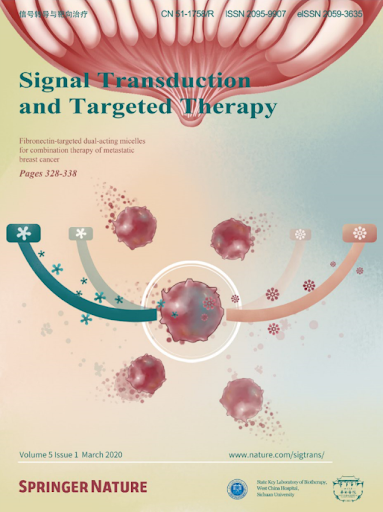Myeloid but not hepatocytic CD38 is a key driver for hepatic ischemia/reperfusion injury.
IF 40.8
1区 医学
Q1 BIOCHEMISTRY & MOLECULAR BIOLOGY
引用次数: 0
Abstract
Hepatic ischemia-reperfusion injury (HIRI) is a critical condition that often occurs during liver transplantation and surgical liver resection. However, its mechanism has not been fully elucidated. Nicotinamide adenine dinucleotide (NAD+), functioning as a coenzyme or cofactor, is crucial for both redox and non-redox processes. In mammals, CD38 serves as the primary enzyme responsible for NAD+ degradation. In this study, we reported that the absence of CD38 markedly reduces HIRI in CD38 global knockout (CD38KO) and CD38 myeloid-specific knockout (CD38MKO) mice, but not in CD38 hepatocyte-specific knockout (CD38LKO) mice compared with the control (CD38fl/fl) mice by suppressing HIRI-induced hepatic oxidative stress, inflammatory responses, and pyroptosis. The findings were corroborated by a noticeable decrease in levels of alanine aminotransferase (ALT), aspartate transaminase (AST), and lactate dehydrogenase (LDH), along with reduced necrosis. Besides, we found that the expressions of SIRT1 and its downstream targets, p53 and PPARγ, were elevated in the liver tissues of CD38KO and CD38MKO mice compared to CD38fl/fl mice, while the acetylation levels of p53 were reduced. Furthermore, we demonstrated that myeloid CD38 deficiency not only promoted M2-type polarization and inhibited M1-type polarization of macrophages but also suppressed NLRP3-mediated pyroptosis by triggering NAD+/SIRT1 signaling in macrophages, resulting in the reduction of oxidative stress, inflammation, and pyroptosis in the liver, ultimately protecting against HIRI. This study highlights myeloid CD38 as a promising target for the prevention and treatment of HIRI clinically.髓细胞而非肝细胞CD38是肝脏缺血/再灌注损伤的关键驱动因素。
肝缺血再灌注损伤(HIRI)是肝移植和肝切除手术中常见的危重疾病。然而,其机制尚未完全阐明。烟酰胺腺嘌呤二核苷酸(NAD+)作为一种辅酶或辅助因子,在氧化还原和非氧化还原过程中都起着至关重要的作用。在哺乳动物中,CD38是负责NAD+降解的主要酶。在这项研究中,我们报道了CD38的缺失在CD38全局敲除(CD38KO)和CD38骨髓特异性敲除(CD38MKO)小鼠中显著降低了HIRI,但在CD38肝细胞特异性敲除(CD38LKO)小鼠中,与对照组(CD38fl/fl)小鼠相比,CD38肝细胞特异性敲除(CD38LKO)小鼠中没有通过抑制HIRI诱导的肝脏氧化应激、炎症反应和焦亡来降低HIRI。这一发现被谷丙转氨酶(ALT)、天冬氨酸转氨酶(AST)和乳酸脱氢酶(LDH)水平的显著下降所证实,同时坏死减少。此外,我们发现与CD38fl/fl小鼠相比,CD38KO和CD38MKO小鼠肝组织中SIRT1及其下游靶点p53和PPARγ的表达升高,而p53的乙酰化水平降低。此外,我们证明髓系CD38缺乏不仅促进巨噬细胞的m2型极化和抑制m1型极化,还通过触发巨噬细胞中的NAD+/SIRT1信号抑制nlrp3介导的焦亡,从而减少肝脏的氧化应激、炎症和焦亡,最终保护HIRI。本研究强调髓系CD38是临床上预防和治疗HIRI的一个有希望的靶点。
本文章由计算机程序翻译,如有差异,请以英文原文为准。
求助全文
约1分钟内获得全文
求助全文
来源期刊

Signal Transduction and Targeted Therapy
Biochemistry, Genetics and Molecular Biology-Genetics
CiteScore
44.50
自引率
1.50%
发文量
384
审稿时长
5 weeks
期刊介绍:
Signal Transduction and Targeted Therapy is an open access journal that focuses on timely publication of cutting-edge discoveries and advancements in basic science and clinical research related to signal transduction and targeted therapy.
Scope: The journal covers research on major human diseases, including, but not limited to:
Cancer,Cardiovascular diseases,Autoimmune diseases,Nervous system diseases.
 求助内容:
求助内容: 应助结果提醒方式:
应助结果提醒方式:


